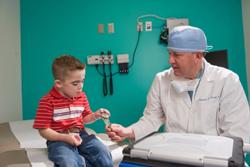
December 19, 2011— Newborns, toddlers and teens who suffer from heart failure and need heart transplantation to survive just got a life-saving pediatric heart pump that buys time and allows them to grow stronger as they wait for a donor heart. The Berlin Heart Group announced that the U.S. Food and Drug Administration (FDA) has granted Humanitarian Device Exemption (HDE) approval of the Berlin Heart Excor Pediatric ventricular assist device (VAD).
Excor is a mechanical cardiac support system for critically ill pediatric patients suffering from severe heart failure. The system is designed to support pediatric patients of all age groups, from newborns to teenagers, and is intended to bridge patients awaiting heart transplantation from days up to several months, until a donor heart becomes available. Excor, which has previously been approved for use in Europe and Canada, is now the only VAD that is designed specifically for the pediatric population to be approved in the United States.
The national principal investigator for the Excor study, Charles D. Fraser, Jr., M.D., surgeon-in-chief and head of the division of congenital heart surgery at Texas Children’s Hospital and professor of surgery and pediatrics, Baylor College of Medicine in Houston, Texas, said, "On behalf of the many investigators, coordinators and administrative personnel involved in the study, I am extremely gratified by the news that the Excor has achieved an HDE approval by the FDA. This is a landmark event for children suffering from terminal heart failure. The medical community is now able to offer this lifesaving device to support desperate children who would not otherwise survive while awaiting a heart transplant. This ushers in a new era for children with heart disease. The study involved an incredible effort from 15 centers across North American with extensive experience in pediatric heart failure and transplantation and should serve as a model for future collaborative device investigations involving children, industry, medicine, and the FDA."
Study background
In January 2008, Texas Children's was named the national lead center for a 12-hospital, 36-month clinical trial of Excor. Fraser was selected as the national principal investigator (NPI) for the individual device exemption (IDE) prospective study. In 2009, five other hospitals were added to the study.
The Excor pediatric clinical study is the first prospective clinical trial ever conducted to investigate the safety and benefit of a VAD in the pediatric population. Between 2007 and 2010, the study enrolled 48 patients in two cohorts of 24 patients each. Another 200 patients were enrolled in a "compassionate use" cohort. Along with Texas Children's Hospital, the following U.S. centers participated in the IDE study: Arkansas Children's Hospital (Ark.), Boston Children's Hospital (Mass.), Children's Healthcare of Atlanta (Ga.), Children's Hospital of Wisconsin (Wis.), The Children's Hospital of Denver (Colo.), Lucille Packard Children's Hospital at Stanford (Calif.), Mott Children's Hospital (Mich.), Mount Sinai Hospital (N.Y.), Pittsburgh Children's Hospital (Pa.), Riley Children's Hospital (Ind.), Seattle Children's Hospital (Wash.), St. Louis Children's Hospital (Mo.), Children's Hospital at the University of Alabama at Birmingham (Ala.), and the University of Minnesota at Fairview (Minn.).
As NPI, Fraser worked in cooperation with all 17 hospitals in collecting and reporting data to the FDA regarding the safety and probable benefit of the pediatric heart pump. On July 21, 2011, Fraser led the IDE study team as they presented the final data to an FDA circulatory support advisory panel, which unanimously recommended that the device be approved by the FDA. The final approval came on Dec. 16, 2011.
Texas Children's Heart Center implanted its first Berlin Heart on Sept. 27, 2005, in one of the smallest babies to ever receive the device. Brady Burch, a Corpus Christi resident, is now 6 years old and in kindergarten. Fraser, who has long advocated that babies need small heart assist devices sized just for them, became proactively involved. He accompanied Berlin Heart representatives to Washington, requesting that the FDA allow an IDE study. The FDA agreed to open a study. The first pediatric patient was enrolled in November 2007.
For more information: www.berlinheart.com


 February 03, 2026
February 03, 2026 









